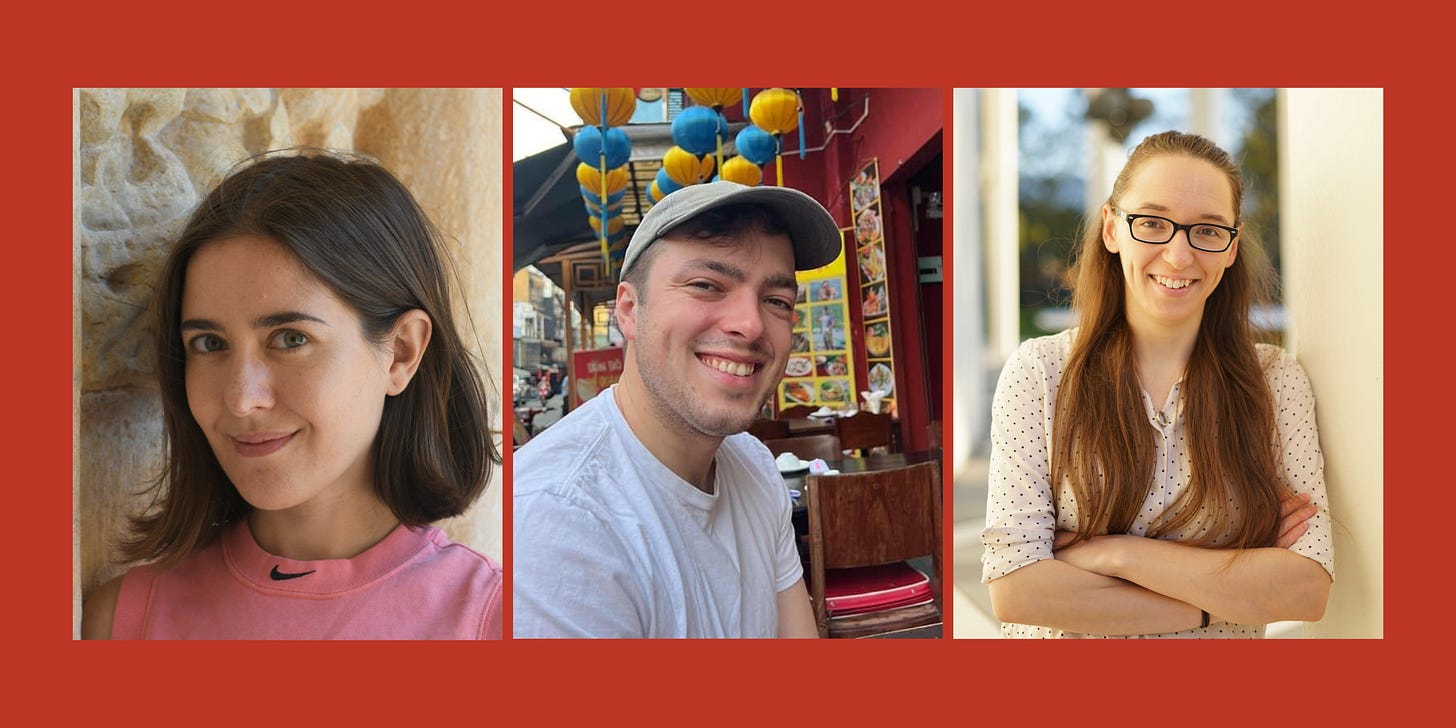✍️Science Writing News Roundup #227
STAT is backing up and monitoring CDC data in real time + Guide to Investigating Fossil Fuels + International AI Safety Report 2025.
Meet The Open Notebook’s 2025 Early-Career Fellows: With generous support from the Burroughs Wellcome Fund, Lucila Pinto, William von Herff, and Skyler Ware will each spend the next year working with individual mentors and the TON editorial team to report and write articles on the craft of science journalism for The Open Notebook. (Image via The Open Notebook)
Welcome! You are reading the Science Writing News Roundup, a newsletter for science writers. You can also read this edition online. Did someone forward you this newsletter? Sign up here.
🌎Resources
STAT is backing up and monitoring CDC data in real time: In the weeks since President Trump took office, the Centers for Disease Control and Prevention has removed at least 135 datasets and other files from its public data platform, data.cdc.gov, a STAT analysis shows.
Access CCNow and AFP's Climate Feed: Covering Climate Now and Agence France Presse (AFP) are partnering to offer media outlets from Latin America, Africa, and Asia free access to AFP’s industry-leading climate news feed.
Health Data Preservation Project: AHCJ is part of a growing coalition of news nonprofits, journalism scholars and others working to conserve and protect vital health data that was previously publicly available on federal websites.
Guide to Investigating Fossil Fuels: The aim of this reporting guide is to provide key context and practical advice to enable better investigations of the fossil fuel industry.
Tipsheet: How To Cover Ocean Issues in Your Newsroom. This tipsheet includes many recommendations from a recently produced Pulitzer Center report, Making Waves, which looks at the current state of ocean reporting and examines opportunities for better storytelling.
International AI Safety Report 2025: The International AI Safety Report is the world’s first comprehensive synthesis of current literature of the risks and capabilities of advanced AI systems. Chaired by Turing-award winning computer scientist, Yoshua Bengio, it is the culmination of work by 100 AI experts to advance a shared international understanding of the risks of advanced Artificial Intelligence (AI).
📣Opportunities
Call for young journalists and communicators – ESMH Summer School 2025. The European Science-Media Hub (ESMH) of the European Parliament is organizing a Summer School in Brussels on 24-26 June 2025 to address the opportunities and challenges of digital science communication.
The Sequencer's Science Storyteller Mentorship Program is a new mentorship program for researchers interested in communicating fascinating science with the public. Any participant with scientific expertise is welcome: undergrads, grad students, post docs, research group leader, industry professionals, and otherwise!
Call for Proposals now open for WCSJ2025: The World Conference of Science Journalists 2025 (WCSJ2025) is now accepting proposals for sessions, workshops, and presentations.
Entries Open for the 2025 Covering Climate Now Journalism Awards: The fifth annual Awards will celebrate excellent climate journalism from around the globe.
More opportunities and calls for pitches 👉 Bonus content for monthly supporters.
🧪Articles
Loving the Questions: Reporting for Essays. This story at The Open Notebook dives into the craft of reporting for essays. "To prepare for the sometimes nonlinear process of essay reporting," writes TON fellow Kate Fishman, "it’s wise to cultivate an open mind about what—and who—might inform your work."
The “Wild West” of Cancer Misinformation Online: At Harvard’s Chan School of Public Health, experts discuss web and social media cancer misinformation.
Tim Radford, former Guardian science editor, dies aged 84. Tributes paid to journalist remembered for infectious enthusiasm for science and talent for turning a phrase.
Behind the Story: Grantee Carl Smith on How He Earned Trust on a Remote Micronesian Atoll. Pulitzer Center grantee Carl Smith is well experienced in traveling to the most remote reaches of the world for a story, but diving with a GoPro camera in the middle of the Pacific Ocean was a new depth for him.
More articles 👉Bonus content for monthly supporters.
💉News
Journalism organizations call for restoration of public data: The Council for the Advancement of Science Writing joins organizations serving science, health, and environmental writers in objecting to the removal of public data and information from more than a dozen federal U.S. websites.
Four Writers Honored as 2025 Fellows: Johns Hopkins University’s MA in Science Writing program, in partnership with the Good Science Project, has awarded four $5,000 fellowships to support investigative feature stories that examine where science goes wrong and how it can be made better. The program, funded by the Good Science Project and administered by JHU’s MA in Science Writing program, recognized the honorees who included freelance writers Sruthi Balakrishnan, Andy Carstens, Lindsay Gellman, and current JHU MA in Science Writing student Katherine Greene.
🔍Videos & Podcasts
How Trump is remaking US public health, with NY Times reporter Apoorva Mandavilli.
What Every Reporter Should Know About AI: What the New Administration Means for AI Policy.
🎤Events
The Future Of Science Reporting, Live In San Francisco (online and in-person). On Tuesday, April 29, join Ira Flatow in conversation with journalists to discuss the role of science writing in or current cultural climate.
Health Journalism ‘25 (May 29-June 1, 2025)
More events 👉Bonus content for monthly supporters.
👩💻Jobs
Thanks for reading! Subscribe for free to receive the next post in your inbox:
Worried you missed something? See previous posts here. What would you like to see in the newsletter? Please send me your suggestions: sciencewriting@substack.com



